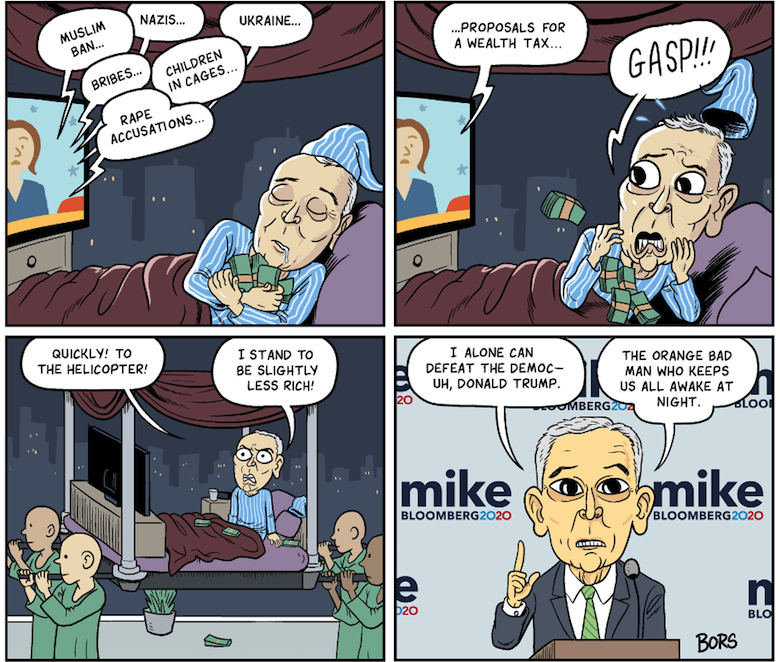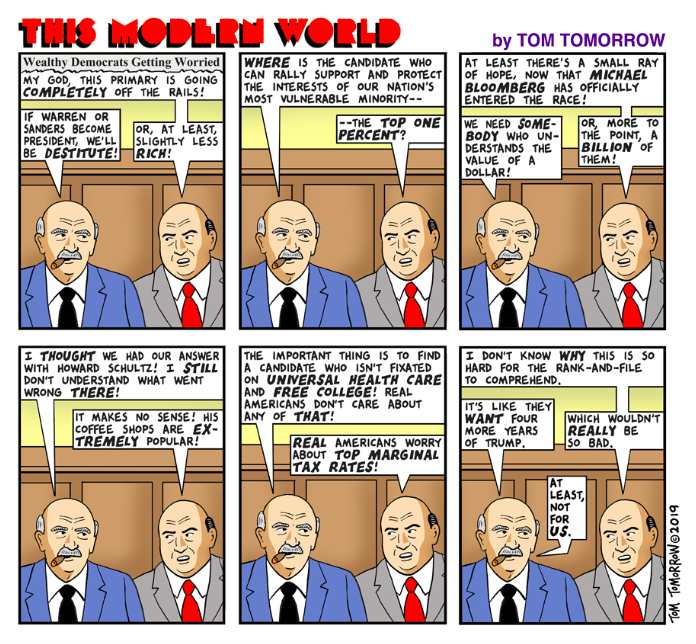It used to be that young children were told that if they worked hard, then one day they could become president. That seems so quaint. Now the advice they should be given is that first they must become billionaires. It used to be that personal wealth used to just buy influence. Then it bought candidates. Now it is what is becoming necessary for people to be candidates. Jon Schwarz examines the big role that personal wealth plays in American politics. He says that the reason why Kamala Harris had to drop out of the race just as Michael Bloomberg entered it is because of a 1976 Supreme Court ruling in Buckley v. Valeo that said that candidates can spend as much of their own money as they want to but are limited in how much they can contribute to other candidates.
Soon after Nixon resigned in 1974, Congress responded with significant amendments to the Federal Election Campaign Act. This included a new limit of $50,000 per calendar year on what presidential candidates could spend of their own money on their campaign. Adjusting for inflation, that’s about $275,000 today.
Just two years later, however, the Supreme Court struck that limit down in the Buckley case. Those running for political office could now spend any amount of their own fortune they wanted. In fact, the court stated, it could be good for the wealthy to self-fund runs for office, because “the use of personal funds reduces the candidate’s dependence on outside contributions and thereby counteracts the coercive pressures and attendant risks of abuse.”
The result of the case is a presidential field where billionaires can hang on seemingly forever without batting an eye and other competitors must strain to keep up by raising funds the old fashioned way: through regular, limited donations and by getting billionaires to give to their dark-money groups.
It is not that Harris did not have billionaire friends and supporters. She has plenty. But even that was not enough.
She also can’t get it funded by one super-wealthy supporter. This isn’t because she’s unpopular among billionaires – just the opposite, in fact. Harris has received donations from 46 billionaires and their spouses, more than any other candidate. But while the Supreme Court struck down limits on how much any politician could spend of their own money, it simultaneously upheld limits on donations to candidates from others. The maximum anyone can give to a presidential campaign this cycle is $2,800 for the primaries, and $2,800 for the general election. Through these comparative drips and drabs, Harris raised her relatively paltry $36 million.
By contrast, Bloomberg has an estimated net worth of $54 billion – 9,000 times that of Harris. His $57 million in ad buys in the 11 days since he announced his candidacy are already more than twice as much as all Harris’s reported expenditures.
Presidential elections now involve expenditures of around $one billion dollars, an obscene amount. What is worse, people like Bloomberg are so oblivious to their own immense privilege, they think that because they can casually run for president, so can anybody else.
The US political system is skewed so much in favor of the wealthy that it is laughable to call it democracy. It is now a naked plutocracy and will only become worse so that in future only billionaires will even run for the presidency.
Unless there is some kind of revolution.



Si vis praesidis, para billions tuum
Veni, vidi, et emit.
I’m currently reading Dark Money: The Hidden History of the Billionaires Behind the Rise of the Radical Right by Jane Mayer. I will finish it, but I have had to stop for a while, because the implications for democracy seem so bleak and that’s just too depressing for words.